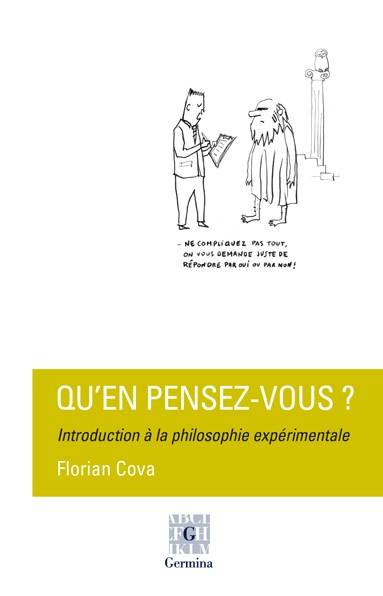What is experimental philosophy?


Is what seems obvious to me obvious to most people? Are my intuitions reliable?
For Florian Cova, Assistant Professor in the Philosophy Department at the University of Geneva, “these are two questions that cannot be answered directly by philosophical speculation, but which call for empirical investigation. This is why, over the last twenty years or so, certain philosophers have seized on the methodological tools of the human and social sciences (and in particular the cognitive sciences) to study the intuitions on which philosophers rely and answer the questions we have just posed. They themselves have given their project the name of experimental philosophy.”
To help you discover this philosophical trend, which is characterized by the conduct of experiments and the use of experimental data to reflect on our intuitions, we offer you a thematic selection, as well as an introductory article on experimental philosophy written especially for the BCUL blog by Florian Cova.
by Florian Cova, Assistant Professor in the Philosophy Department at the University of Geneva
As we know, philosophers rarely agree, whether on the nature of reality, on what is right or wrong to do, or on what it means to know something. But how do philosophers resolve these disagreements? When scientists defend opposing theories, they design experiments to determine which theory makes the best predictions. But it’s hard to see how an experiment could help us determine what the good life is, what legitimizes political government, or what distinguishes mere belief from true knowledge. So what do philosophers do?
The answer is simple: they argue. But their arguments are not only based on empirical observations, they also often start from principles that are accepted as self-evident enough to allow a decision to be made between the various theories. For example, against the theory that it is always wrong to lie (which he attributes to Kant), Benjamin Constant proposes the following thought experiment: if it were always wrong to lie, then it would be wrong to lie to a murderer who comes to our door and asks where his victim is. Yet it’s clear and obvious that it would be acceptable to lie in such a case. So the theory that it’s always wrong to lie is wrong.
Similarly, to show that knowledge (the act of “knowing”) cannot be reduced to true belief, Bertrand Russell proposes the following thought experiment: imagine a man who is trying to find out the time and glances at a clock near him. The clock reads noon, so he concludes that it is. What the man doesn’t know, however, is that the clock is broken and shows noon all the time. As luck would have it, it’s actually noon. In this case, our man has a true belief: he thinks it’s noon, and it is. But, for Russell, it’s clear that our man doesn’ t know it’s noon, because the fact that his belief is true is a huge stroke of luck. This shows that knowledge is something more than a true belief.
In both cases, philosophers conclude whether a philosophical theory is false or true on the basis of cases that seem immediately clear and obvious: it’s clear that it would be acceptable to lie to a murderer, it’s obvious that man believes but doesn’t know he’s noon. In metaphilosophy (the “philosophy of philosophy”), we call intuitions such propositions that seem intellectually attractive on their own. And, because the intellectual appeal of these intuitions does not depend on prior observations, theories or reasoning, they play an important role in the discussion of philosophical theories (a role equivalent to that played by observations in the sciences).
However, this use of intuitions in philosophy raises two questions. The first is whether what seems obvious to me is in fact obvious to most: philosophical arguments that rely on such intuitions usually assume that most people who read the argument will share the original intuition (otherwise the argument fails). But is this really the case? The second is whether this intuition is reliable. Indeed, it could be that my intuition is the product of certain biases and fails to capture reality. Can I really trust my intuition?
These are two questions that cannot be answered directly by philosophical speculation, but require empirical investigation. This is why, over the last twenty years or so, certain philosophers have seized on the methodological tools of the human and social sciences (and cognitive science in particular) to study the intuitions on which philosophers rely and answer the questions we have just posed. They themselves have given their project the name of experimental philosophy.

Let’s return, for example, to the first question: are the intuitions on which philosophical arguments are based widely shared? The answer is: not always. Let’s take an example: in the philosophy of art, it’s common to start from the idea that there’s a crucial difference between aesthetic judgment (which concerns the Beautiful) and other judgments of taste (which concern what is pleasurable). Indeed, according to a tradition that goes back to Hume and above all Kant, the judgment about the Beautiful is distinct from the others in that it carries with it a claim to universality: when we judge that something is beautiful, we are not judging that it is beautiful for us, but that it is beautiful for everyone. But is this really the case? A team of experimental philosophers conducted a survey in 19 different countries, in which they asked people to describe an object they found particularly beautiful, and then to imagine that someone disagreed with them. They then asked participants to choose one of three possibilities: (1) one of you is right and the other is wrong, (2) you are both right, (3) nobody is right and nobody is wrong. If participants were to universalize their judgments, they would have to choose the first option. Yet the first option was the least frequently selected, in every country. Such results have led some philosophers to question the claim that judgments about beauty are distinguished by their claim to universality.
And what about the reliability of intuitions? A famous argument against hedonism (the theory that the good life consists in having as much pleasure as possible) is that of Robert Nozick’s experience machine. Nozick asks us to imagine that scientists have developed a machine that allows those who connect to it to spend the rest of their existence in a virtual reality that will enable them to live a life full of pleasures and pleasant experiences (while forgetting, if need be, that this life is not real). If hedonism is true, then we should log on to this machine, for that is the assurance of a life full of pleasures. Yet, Nozick points out, most of us would refuse to connect to this machine, preferring to continue living our “real” lives. For Nozick, this shows that we intuitively consider the good life to be more than just the pursuit of pleasure, and that we prefer “real” experiences, even if they are less pleasant.
Do people share Nozick’s intuition? Yes: experiments show that, when asked to imagine this choice, most people prefer to stay out of the machine. But does this illustrate a robust preference for “real” experiences and a profound rejection of hedonism? Not necessarily. Some experimental philosophers wondered whether this preference was not simply the result of a bias: the status quo bias, which leads us to prefer our current situation. So they asked participants to imagine a reverse scenario: one day, they learn that they are already connected to the machine and have spent most of their existence in a virtual reality. They are then given the choice of disconnecting to return to reality, or remaining connected for the rest of their lives (while forgetting that they are in a virtual reality). When the thought experiment is framed in this way, participants are much more divided, and their preference for “real” experiences much less clear. So people share Nozick’s intuition, but it’s not clear that it supports his argument by illustrating a profound rejection of hedonism more than a simple bias.
Should we therefore abandon the use of intuitions in philosophy? This is what some experimental philosophers propose, defending what is known as the “negative program”. But they are in the minority, and most experimental philosophers see experimental philosophy as just another tool in the philosopher’s toolbox, keeping a watchful eye on how philosophers use intuitions in their arguments. Still others place themselves under the aegis of Locke, Hume and Nietzsche, and see experimental philosophy as a return to classical philosophical questions about the origin of our ideas.
There are two introductory works to experimental philosophy in French. Ruwen Ogien’s L’influence de l’odeur des croissants chauds sur la bonté humaine focuses on the use of experimental philosophy in the field of ethics. My book What do you think? An introduction to Experimental Philosophy offers a more general presentation, but is now out of print. You can find a pdf version here. Bear in mind that both books are already a decade old, and do not represent the current state of the field.
The online magazine Klesis has devoted one of its issues to experimental philosophy.
In the spring semester of 2023, I will be teaching a course (for Bachelors and Masters students) on experimental philosophy at the University of Geneva.
The popularizer Mr Phi invited me for a freewheeling chat about experimental philosophy and its methods. He also used methods similar to those of experimental philosophers to discuss the nature of freedom and knowledge.